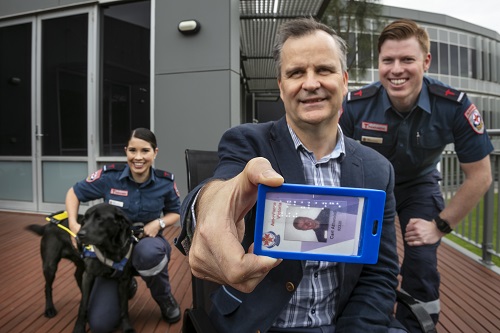Ambulance Victoria staff will be more identifiable by people who are blind or have low vision, thanks to a new accessibility initiative.
Ambulance Victoria is providing all paramedics with braille stickers that will adhere to their ID cards. The stickers read “Ambulance” on one line and “0” “0” “0” (Triple Zero) on the line below.
“Anyone can claim they are a paramedic. But how would a patient who is blind know if someone is an actual paramedic? Having braille on our ID cards acts as an identification marker so you have something to prove it when you say “I am a paramedic” to a patient, or even a bystander, who is blind or has low vision,” Kate Taylor, an Ambulance Victoria paramedic, said.

Caption: Chris Edwards, Vision Australia Manager Government Relations and Advocacy, holds a paramedic ID card with the newly released braille sticker, with Seeing Eye Dog Odie and Ambulance Victoria paramedics Kate and Carl.
Ambulance Victoria is the first ambulance service in Australia to introduce braille to staff ID cards, after the idea originated with London Ambulance Service paramedic Dean Buttery when he needed to quickly identify himself to a blind man who needed assistance, but had not called for an ambulance and who was surrounded by strangers on a London street.
“We don’t get to choose which patient we go to. We get a call and we go to the person that needs our help. We often need to be able to help in a variety of ways, not just through traditional verbal communication,” Kate said.
“One of the biggest things that helps us deliver best patient care is gaining the trust of the patient as soon as possible,” Carl Attwood, an Ambulance Victoria paramedic, said.
Chris Edwards, Vision Australia manager government relations and advocacy, applauded Ambulance Victoria for adopting the initiative.
“This is a great example of how organisations can consider the needs of people with a disability and work alongside them to come up with a practical way of addressing them,” Chris said.
“Situations where you need help from a paramedic are likely to be extremely stressful. The stickers are a simple way to let people who are blind or have low vision know they’re receiving help from a trusted source and help put them at ease,” he said.
The initiative is part of Ambulance Victoria’s commitment to provide accessible and inclusive emergency health care to all Victorians.
Currently, more than 4,500 of the stickers, produced by Vision Australia’s Print Access team, have been provided to Ambulance Victoria’s 6,000 paramedics.
“Anything that helps us communicate with patients and streamline patient assessment - whether that be through braille on our ID cards, apps or communication boards - is going to be positive for our patients, us as paramedics and Ambulance Victoria as an organisation,” Carl said.
Ambulance Victoria worked with Vision Australia and consumers to determine the viability of the stickers and during their development. Along with paramedics, Ambulance Victoria corporate staff who engage with consumers and the broader community have also been encouraged to add the stickers to their ID.
This is one example of how Ambulance Victoria is making its service more accessible to all Victorians, and coincides with the release of Ambulance Victoria’s first Accessibility Action Plan. The plan, available in various accessible formats, and further information can be found here: www.ambulance.vic.gov.au/accessibility










